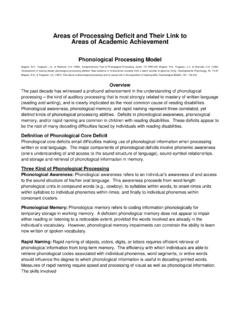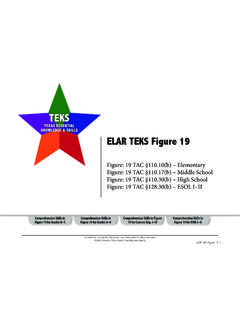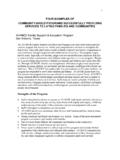Transcription of 123 - Region 13
1 123. Parent Handbook for SPECIAL education . Free downloadable copy of this handbook is available from ESC Region 13 at uploads/facilitatingIEPs/ A. Introduction Dear Parents, This handbook is designed to help you navigate the special education process. Although federal law assures that parents are equal players, sometimes even an experienced parent feels like an outsider on his or her child's team. As a parent, you play a unique role: you are the only one on your child's team who can provide history, certain types of information, planning and support, outside intervention, and commitment for the long haul. This makes you a key player on your child's school-based team; parents who understand how and where to make their unique contributions enhance the professionals' ability to do their parts. The art is in playing as strong a parental role as possible to add to and not hamper the ability of each of the professionals on your child's team to do the same.
2 Why Navigating Special education Is Tricky The initial target for any school-based intervention is to keep the student in grade-level academics and provide developmentally appropriate social, behavioral, and emotional experiences. Schools are required to intervene (take action) if a student's achievement level diverges greatly from that of his or her peers. The school's goal is to keep its students on track with their peers, and if that's not possible, then to get them as close as possible. Also, the principles that dictate which targets in school are most important are increasingly informed, as the student gets older, by his or her future goals and needs for adulthood. To complicate things further, parents and educators alike recognize the value in a certain amount of struggle. If everything is always easy, or accommodations, support, or expectations make things too easy, then our students may not be challenged enough.
3 Parent professional teams who support a student with a disability often wrestle with hard questions, such as whether independence is more important than academic achievement, the role of social success and opportunities now and in the future, and more. Time and priorities often conflict with each other; teams sometimes have to make difficult choices. A 2. Our Goal: Improved Outcomes for Students by Helping Parents Function as Equal Players with School Professionals This handbook is intended to give parents a basic grounding in the special education process and the use of collaborative strategies and facilitation skills and techniques to improve that process. We hope to give parents tips, tools, tactics, and educator perspective all of which will enhance collaboration with the school team. Ultimately, better collaboration among the adults in your child's life will improve his or her educational outcomes.
4 Our Recommendation First, read the section How Special education Works in its entirety. Then, feel free to jump to the section that makes the most sense for your situation. We hope you will return to the various sections of this handbook at different times as you navigate your child's special education process. A 3. How This Handbook Is Organized All special education requirements do not apply in every situation. Each student is an individual. Requirements and plans vary depending on the unique characteristics of the student and his or her instructional, social, behavioral, and functional needs. This handbook tracks the fundamental steps of the special education process that apply to all students: A. Introduction B. How Special education Works: 1. General education : Interventions outside, or leading up to, special 13.
5 2. Evaluation: Eligibility determination and foundation for 21. 3. Individualized education Program (IEP): Plan for instruction and related 31. 4. Admission, Review, and Dismissal Process (ARD)/IEP Meeting: Development and adoption of the 44. 5. Individualized education Program (IEP): The plan in action, tweaks, and 56. i. Part 1: Implementation ii. Part 2: IEP Monitoring and Reporting 6. Dismissal, Graduation, and Revocation: Exit from special education and/or related 64. C. Facilitation: Improved Discussions and D. Additional Resources:..82. 1. Tools:..83. 2. Acronyms:..108. A 4. Within each section, you will find: BASICS: This section provides fundamental information about each stage of the process. Our intention is to give you the essentials that any parent needs to play an effective 123 role in the process.
6 While we could provide much greater detail in each section, we have deliberately chosen only the most essential so that if the basics is all you have time for, you can go confidently into your child's ARD/IEP planning. TIPS: These are how-to strategies that you can use to make the process easier, either in your role as parent or for your counterparts on the school team. Tips incorporate suggestions from other parents and recommendations from educators. COLLABORATIVE STRATEGIES: These are approaches or perspectives that will help the best, most individualized information come up for discussion, regardless of how unlikely, or difficult, or who presents it. Collaborative strategies help both with delivering and receiving communication from another person. These strategies also facilitate relationship building, which acts like an insurance policy to prevent a slight bump in the road from becoming adversarial.
7 BEHIND THE SCENES WITH EDUCATORS: This section reveals parts of the educational process that parents typically don't see. This is not to imply a deliberate lack of transparency on the part of educators, but more to acknowledge that, just like in any business, some parts of the public education system simply have more to do with operations, personnel, or preparing for students behind the scenes. We added this because sometimes parents unknowingly pressure relationships with school only because they are unaware of some of the realities of professional public school life. This perspective reveals some of the most common information that educators wish parents knew but often don't state. A 5. WANT MORE INFO? FEDERAL AND STATE LAWS AND REGULATIONS. REGARDING SPECIAL education . IDEA 2004 Parent Information Line Special education in Texas Legal Framework for the Child- Texas education Agency (TEA) Texas education Agency (TEA).
8 Centered Special education Process aspx?id=2147491399. PARENT-TO-PARENT ADVICE, PERSPECTIVE, AND. APPROACH TO SPECIAL education . Partners Resource Network (PRN) Texas Project First Parent Information Center ESC Region 10. Texas Parent to Parent (TxP2P) NATIONAL UNIVERSITY CENTERS. Association of University Centers on Disabilities (AUCD). A 6. B. How Special education Works: Overview How Special education Works GENERAL education DISMISSAL. INTERVENTION GRADUATION. REVOCATION. IEP MONITORING SPECIAL EVALUATION. AND REPORTING. education . PROCESS. IEP IEP DESIGN. IMPLEMENTATION ARD/IEP MEETING. B 8. How Special education Works 123 BASICS. Overview of the ARD/IEP Process Each student who receives special education services has an individualized plan for progress. A team develops the plan, which follows an ongoing process with predictable stages.
9 The stu- dent's plan is called the IEP (Individualized education Program), and the team that designs it is a committee made up of the parents, the student (depending on age), and a number of school professionals, each representing different roles. The stages of the special education process form a repeating cycle, beginning with an evalu- ation of where things are (student's strengths, needs, and performance) and moves next to the creation of a plan of action (the IEP). Next, the team implements the plan and monitors the student's progress. At the end of the cycle, the team examines the student's growth, de- termines his or her new starting place, updates the plan for further advancement, and begins carrying out the new plan. With each repetition of this cycle of evaluate, plan, implement, monitor, re-evaluate, the team measures the student's growth as goals are mastered, contin- ued, or reset at higher levels.
10 Over time, the broad goal is for the student to close gaps relative to his or her peers and to work toward an age-appropriate grade level, and ultimately, adult- level independence. In Texas, this special education process is called the Admission, Review, and Dismissal (ARD). process. Other states refer to this as the IEP process. For purposes of this handbook, we use both terms: you will see references to the ARD/IEP process, ARD/IEP meetings, ARD/IEP. team or ARD/IEP committee. Who Is on My Child's ARD/IEP Team? The IEP must be developed through mutual agreement of the team members, including parents. Schools must take steps to ensure that parents have an opportunity to participate in planning, decision making, and meetings. Decisions are made through consensus, or mutual agreement. ARD/IEP committee members include the following: 1.













